


 Coastline views of Sydney and along the southern coast
Coastline views of Sydney and along the southern coast
 Our baggage helpers upon arrival in Hobart
Our baggage helpers upon arrival in HobartDIARY/PHOTO JOURNAL - Page 21
Week 26 - September 09, 2018 - September 19, 2018 (a long, wonderful 'week')
TASMANIA! TASSIE! TAS! Do I need to say more? Well, I will as this island-state has so much going for it and thousands of words are expressed in hundreds of pictures.
We flew from Sydney, across the Bass Strait, and landed in the Capital city of the 26th largest island in the world, Hobart, Tasmania. We decided to leave Cinderoo in Sydney as we agreed that with what was purported to be some narrow roads, lots of hills, inclement weather and a substantial number of inexpensive B and B's, we were a tad better off flying to Tassie and driving around the island in a small car.



 Coastline views of Sydney and along the southern coast
Coastline views of Sydney and along the southern coast
 Our baggage helpers upon arrival in Hobart
Our baggage helpers upon arrival in Hobart
Upon arrival, we had plenty of time to
see a bit of Hobart and its surrounds and started off our self-guided tour with
a drive up to the top of Mt. Wellington. Mt. Wellington watches over
Hobart and a drive to the top passes through what feels to be a few
meteorological zones as evidenced by the significant drop in temperature and the
presence of snow at the summit. We held onto our hats and roamed around
the lookout area while taking in the sights the stunning Hobart landscape.

![]() Views to Hobart area below
Views to Hobart area below

 Just a tad cold and had fun seeing snow
Just a tad cold and had fun seeing snow
Then, it was back down to sea level
with a walking tour of Hobart and to find a spot to just sit and breathe in the
beauty of the harbour. It did not take long walking amongst the older
buildings and along the waterfront to find a nice little restaurant.


 Just a few of the buildings with character
Just a few of the buildings with character

 Hobart harbour area
Hobart harbour area
 Our lunch view
Our lunch view
![]()
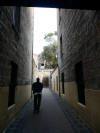 The famous Salmanca Market is held here and passageway to the upper
neighborhoods
The famous Salmanca Market is held here and passageway to the upper
neighborhoods


 Typical houses and street
Typical houses and street
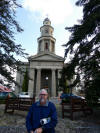 Just a nice church
Just a nice church
 St. David's Park and cemetery - original cemetery for Hobart, memorial walls
St. David's Park and cemetery - original cemetery for Hobart, memorial walls
We enjoyed our first night in Hobart in
an older home B&B and were off early the next day for a drive to Tassie's
southeastern peninsula towns around Port Arthur. A few stops along the way
included the Richmond Bridge (a Heritage listed arch bridge built in 1825), the
Tessellated Pavement (cool geomorphic rock formation) and Tasman National Park (Eaglehawk
Neck, Blowhole, Tasman Arch, Waterfall Bay).

![]() Miller's Cottage at the Richmond Bridge
Miller's Cottage at the Richmond Bridge
 Pretty duck keeping a little eye on me
Pretty duck keeping a little eye on me
 Just a typical beautiful Tassie cottage
Just a typical beautiful Tassie cottage
![]()
![]()
 Tessellated Pavement - Mother Nature's tile floor
Tessellated Pavement - Mother Nature's tile floor
![]() Eaglehawk Neck (connects Forestier Peninsula to the Tasman Penisula)
Eaglehawk Neck (connects Forestier Peninsula to the Tasman Penisula)

 Along the Tasman Peninsula coast
Along the Tasman Peninsula coast
(Interesting note: the 100m wide isthmus would have a row of ornery
dogs chained across it to 'discourage' the convicts from escaping the
Port Arthur prison - referred to as the "Dogline".)


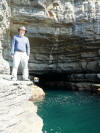 Blowhole - ocean enters through the rock
Blowhole - ocean enters through the rock


 Walking along the Tasman Peninsula coast at low tide
Walking along the Tasman Peninsula coast at low tide
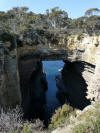 Tasman Arch - natural bridge
Tasman Arch - natural bridge

 Waterfall Bay and its namesake
Waterfall Bay and its namesake
 Fortescue Bay
Fortescue Bay
 Color is everywhere
Color is everywhere
You would think that all of this was
enough for one day, but wait... there is more sunshine to be enjoyed and a
self-guided tour around Port Arthur was squeezed in the afternoon. Between
1830 and 1877, Port Arthur housed approximately 12,500 convicts who had
committed crimes in the colony. The 'fort' was built on a peninsula and
was considered a 'natural penitentiary' due to being surrounded by ocean and its
only connection to Tasmania was through the Eaglehawk Neck isthmus, a mere 100m
(300ft.) wide. Between the 'Dogline' and the rumours of shark-infested
waters, escape was not often attempted.


 A quick boat trip around Port Arthur
A quick boat trip around Port Arthur

 Isle of the Dead and Port Arthur
Isle of the Dead and Port Arthur


 Port Arthur's main prison and a fearsome convict
Port Arthur's main prison and a fearsome convict
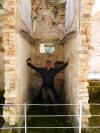
 Very small cells
Very small cells
 Interesting story of one convict
Interesting story of one convict


 Guard's Tower and Hospital/Infirmary
Guard's Tower and Hospital/Infirmary


![]() Officer's building and Prison Cathedral
Officer's building and Prison Cathedral
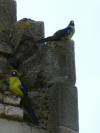 Green Rosella or Tasmanian Rosella - present guards at Port Arthur
Green Rosella or Tasmanian Rosella - present guards at Port Arthur
And, as the sun was still in our favour,
we took advantage of the last hour of the day and visited the Remarkable Cave, a
cave where the ocean has pounded its way through the rock and created an inner
wavepool.

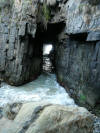
 Walk to the Remarkable Cave
Walk to the Remarkable Cave

 Views along Maingon Bay and to Raoul Bay Lookout
Views along Maingon Bay and to Raoul Bay Lookout
After our dawn to dusk first day and a very good night's sleep, we were off to drive northward, along the east coast of Tassie. Numerous beaches were on our list and as the weather was cooperating, we took the time to veer off to visit Freycinet National Park and the iconic Wineglass Bay.
![]() Prosser Bay
Prosser Bay

 Little Swanport
Little Swanport
 Tasmanian Devil (with a few embellishments)
Tasmanian Devil (with a few embellishments)


 Views of the countryside along the coast - stunning
Views of the countryside along the coast - stunning

 Spiky Bridge is aptly named - 1840's
Spiky Bridge is aptly named - 1840's

![]() Kelvedon Beach
Kelvedon Beach
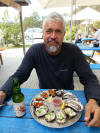 Enjoying local fare - Freycinet Marine Farm
Enjoying local fare - Freycinet Marine Farm





 Hike to Wineglass Bay overlook
Hike to Wineglass Bay overlook



 Iconic Wineglass Bay
Iconic Wineglass Bay



 Some friendly locals waiting for us in the parking lot
Some friendly locals waiting for us in the parking lot




 Cape Tourville
Cape Tourville

 Surfer at sunset - Bicheno
Surfer at sunset - Bicheno
Easing further up the coast, we were still enjoying the
benefits of lovely weather and gorgeous landscapes. Tasmania, like most of
Australia, is sparsely populated and you go long stretches between towns and
coastal construction, and it's wonderful. We made our way from Bicheno to
the Bay of Fires and finally landed for the night in Launceston, Tassie's second
largest city.
 A local looking for lunch - Flame Robin
A local looking for lunch - Flame Robin

![]() Never get tired of these views
Never get tired of these views







![]()
![]()
![]() Bay of Fires - the 'fire' is an orange lichen (algae and fungus)
Bay of Fires - the 'fire' is an orange lichen (algae and fungus)
 Plant competing with the Bay of Fires colors
Plant competing with the Bay of Fires colors


 Beaches and view from The Gardens
Beaches and view from The Gardens

 Black Swans and a Pied Oystercatcher
Black Swans and a Pied Oystercatcher


 Landscapes coming into the hamlet of Derby
Landscapes coming into the hamlet of Derby


 Legerwood and its famous tree-stump carvings
Legerwood and its famous tree-stump carvings
 On the way to Launceston
On the way to Launceston

![]()
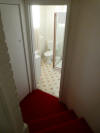

 Our B&B - Hillview House, Launceston - built in the 1840's - room and views were
lovely
Our B&B - Hillview House, Launceston - built in the 1840's - room and views were
lovely
The infamous Tasmanian climate was
beginning to creep up on us so we took advantage of a window of dry time to walk
along the Cataract Gorge, just outside of Launceston. No sooner than we
returned to our car, was the rain upon us and our tour around Launceston was
made from the confines of our warm vehicle. Many historical buildings
enhance the charm of the city and we enjoyed our bitumen wandering through the
town.



 Cataract Gorge and walking across the suspension bridge
Cataract Gorge and walking across the suspension bridge
 The daffodils are in bloom - it's spring
The daffodils are in bloom - it's spring


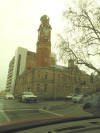 Just a sample of the historic buildings in Launceston
Just a sample of the historic buildings in Launceston
 We really liked this representation of sails
We really liked this representation of sails
We were fortunate to leave Launceston
and drive out of the rain and into sunshine once again. We visited the Low
Head lighthouse, where the Tamar River meets the Bass Strait and soaked in the
warmth before we turned back into the chill of the rain.
 Along the Tamar River
Along the Tamar River
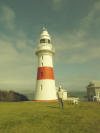
![]() Low Head lighthouse and its surrounding countryside
Low Head lighthouse and its surrounding countryside
An exciting find was the Devils Gullet.
While on our way from Launceston to the Cradle Mountain National Park, we
stopped off to see this incredible chasm. We walked through the tundra
landscape and an eerie fog was rolling in. The trail ended at the Devil's
Gullet and we were looking straight down hundreds of feet at otherworldly
rock formations and valleys. Within minutes of our arrival, we were
swallowed up by the fog. As Gerson quipped "Winter is coming!"



![]()
![]()
![]() Otherworldly landscape
Otherworldly landscape


![]()



 Devil's Gullet and the engulfing fog
Devil's Gullet and the engulfing fog
Cradle Mountain National Park was our next stopover and we crossed our fingers for a good-weather day with which to explore the park. The weather gods listened to our pleas and we had a glorious day exploring the park and hiking up to Marion's Lookout. The day started with my opening the drapes of our hotel room to be greeted by several local Pademelons enjoying their breakfast and ended with us exhausted with, a camera full of photos and with a mind full of memories.


 Having breakfast with the local Pademelons (like Wallabies)
Having breakfast with the local Pademelons (like Wallabies)
![]() Morning views of the national park
Morning views of the national park

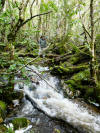


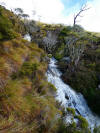


 Hiking along the Overland Track - beautiful
Hiking along the Overland Track - beautiful

![]() Crater Lake
Crater Lake
![]() View to Lake Lilla and Dove Lake
View to Lake Lilla and Dove Lake


 Marion's Lookout and spectacular view to Cradle Mountain
Marion's Lookout and spectacular view to Cradle Mountain

![]() Views from Marion's Lookout
Views from Marion's Lookout
 Our lunch view
Our lunch view



 Down we go
Down we go



 Cradle Mountain in all its glory
Cradle Mountain in all its glory
 A local visitor trying to mooch food
A local visitor trying to mooch food
 Gorgeous landscape throughout the park
Gorgeous landscape throughout the park
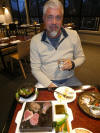 Dinner - stone cooked meats which included Wallaby (no, not our morning
visitors)
Dinner - stone cooked meats which included Wallaby (no, not our morning
visitors)


 Tasmanian Tiger - extinct in 1936. A thylacine - nocturnal, dog-like,
carnivorous marsupial, also known as the Tasmanian Wolf,
Tasmanian Tiger - extinct in 1936. A thylacine - nocturnal, dog-like,
carnivorous marsupial, also known as the Tasmanian Wolf,
became extinct through hunting and with the significant reduction of the
animals, the in-breeding sealed their fate.
Although we loved Cradle National Park,
the weather had other plans for us so we drove onward and hoped to be able to
view a bit of the southern side (and lower elevation) of the park. We
wandered westward and arrived at Strahan for lunch and a bit of a respite before
heading back east and having a lovely stay in Queenstown. Queenstown, not
a town that one might consider as beautiful, at least not by Tassie standards,
but even its denuded hillsides (acres of forest were removed for building and
mining) have a certain attraction in their brightly hued rocks left bare.
And, as we found a gem in the Empire Hotel and its fantastic Tasmanian Blackwood
National Trust staircase, we quite liked Queenstown.

 Driving west under the fog
Driving west under the fog
 A bit of sunshine along the Southern Ocean coast
A bit of sunshine along the Southern Ocean coast
 Strahan was a bit stormy
Strahan was a bit stormy


 Queenstown, its mountain train and some colorful waterfalls
Queenstown, its mountain train and some colorful waterfalls


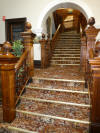


 The Empire Hotel circa 1901 and its magnificent National Trust Staircase
The Empire Hotel circa 1901 and its magnificent National Trust Staircase
 Gerson enjoying the Empire lounge
Gerson enjoying the Empire lounge
Heading southeast from Queenstown to
Maydena, there were numerous places to stop off and lookout over the landscape,
walk along rivers and up to waterfalls and just take in all that Tasmania has to
offer.

 View back to Queenstown and large waterfall
View back to Queenstown and large waterfall
![]()
 Lookout over the quarry and Emerald Lake
Lookout over the quarry and Emerald Lake



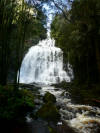
 Snowy walk to Nelson Falls
Snowy walk to Nelson Falls
 A bit of fun with the snow
A bit of fun with the snow
![]() View from Donaghys Hill
View from Donaghys Hill
![]() View to the Franklin-Gordon Wild Rivers National Park - area known for the
Franklin River Blockade, a movement that blocked the Hydro
View to the Franklin-Gordon Wild Rivers National Park - area known for the
Franklin River Blockade, a movement that blocked the Hydro
Electric Commission
from building a dam that would have destroyed much of the (then nominated) World
Heritage park.

 Just a little snowstorm to make the drive interesting
Just a little snowstorm to make the drive interesting
![]()
 Stop for lunch at Lake St. Clair
Stop for lunch at Lake St. Clair

 Brady's Lake and just a beautiful rainbow
Brady's Lake and just a beautiful rainbow




 Russell Falls
Russell Falls
We overnighted in Maydena and set our
sights on reaching Hobart with some time to enjoy a bit more of what the city
has to offer. One of those things was MONA (Museum of Old & New Art) as it
had come recommended by multiple sources.

 Walk to Junee Cave
Walk to Junee Cave
 Junee Cave and its under-mountain waterfall
Junee Cave and its under-mountain waterfall
 Maydena area landscape
Maydena area landscape
We made it to MONA and I could spend a
lot of time discussing this 'museum' and I would rather not. Simply
stated, it was terrible. We agreed that of all the museums we have ambled
through and of all the 'art' galleries we have pondered, this was by far the
worst and a waste of our money. It was pretentious, absurd (in a sad way), sophmoric and although there were a few pieces that had some interest, they
could not lift the rest of the displays out of their horrible holes.

 Water display - Julius Popp Bit.fall - water droplets reflect trending internet
words
Water display - Julius Popp Bit.fall - water droplets reflect trending internet
words
 Basement carved out of the banks of the River Derwent
Basement carved out of the banks of the River Derwent


 Gregory Barsamian - a comment on our slow cognitive process and that we only
realize 'bits' of all the data processed in our brains
Gregory Barsamian - a comment on our slow cognitive process and that we only
realize 'bits' of all the data processed in our brains

 Erwin Wurm - fat car - example of gluttony and wanting more
Erwin Wurm - fat car - example of gluttony and wanting more

 Mummified cat and Central American artifact
Mummified cat and Central American artifact
![]() Best part of MONA - the view from the property
Best part of MONA - the view from the property
We opted to stay at the wonderful
Lowena Accommodation and Cafe that we stayed at for our first night in Hobart.
The owner, a cheery Chinese man named Kevin, upgraded our room to a two-room
suite and we were happy campers.


![]()
![]() Lowena Accommodation - lovely place
Lowena Accommodation - lovely place
Our last day in Tassie was spent
driving (and eating) around Bruny Island and just soaking up our last hours of this paradise
state. We toured the 50k long island from top to bottom, and only the
encroachment of night made us leave and go back to Hobart.
![]() On our way to Bruny Island
On our way to Bruny Island

 Crossing the D'Entrecasteaux Channel
Crossing the D'Entrecasteaux Channel

 Barnes Bay
Barnes Bay



![]() Dennes Point and northern end views
Dennes Point and northern end views
 Gerson loved the drive-thru oyster place
Gerson loved the drive-thru oyster place
![]() Eaglehawk Neck - Isthmus Bay and Adventure Bay
Eaglehawk Neck - Isthmus Bay and Adventure Bay

 Simpson's Bay
Simpson's Bay
 Lunch in Alonnah was superb
Lunch in Alonnah was superb
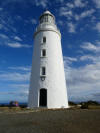
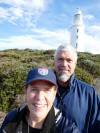 Touching the southern end - Bruny Island Lighthouse
Touching the southern end - Bruny Island Lighthouse

 Waves battering the rocks
Waves battering the rocks

 Lighthouse Bay
Lighthouse Bay

![]() Quiet Bay and Court Island
Quiet Bay and Court Island
![]() Lighthouse Bay and Quiet Bay
Lighthouse Bay and Quiet Bay
Our time in Tasmania was, much like the beloved Tasmanian Devil cartoon character, a whirlwind and our flight back to Sydney gave us some time to reflect on all the wondrous places we saw and the beautiful landscapes we enjoyed. Although we did not see any living Devils (a few road kills unfortunately), we have no regrets as to anything missed. What a fantastic place!